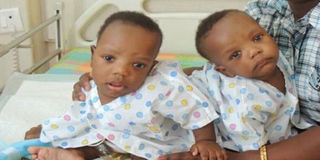Tz twins survive record operation

Ericana and Eliudi.PHOTO|FILE
What you need to know:
- The boys shared an anus, urinary passage and a penis and worse still, born to a single poor mother who could not afford to raise even one per cent of the cost of the operation to separate them
Chennai/Dar es Salaam. For Ericana and Eliudi, the nine-month-old conjoined male twins from Rural Dodoma, growing up and living like any other children once seemed a dream too far. Known as pygopagus twins, they shared an anus, urinary passage and a penis. Worse still, they were born to a single poor mother who could not afford to raise even one percent of the cost of the operation to separate them.
But the twins were finally free of each other on Monday this week, thanks to a gruelling 12-hour operation that the medical world has acclaimed as one of the world’s record surgeries. The operation was also the first of its kind in India’s medical history.
The nine-month-old twins were separated on Monday by a 20-member team at Apollo Hospital. Yesterday, doctors said the twins were stable and were likely to be discharged in January if no major medical complication arises.
The surgery, estimated to have cost an estimated Sh100 million, means the twins will be able to look each other in the eye for the first time since birth. The Tanzanian government, according to the hospital, has come forward to sponsor a major part and the hospital is prepared to chip in with the rest.
Although conjoined twin females have lived up to 44 years in Bohemia, experts at the hospital says only four cases of conjoined males have been successfully separated.
Their mother and the hospital had asked for prayers and good wishes from people all over the world ahead of the operation that was beamed live due to its stake in medical history.
The twins were wheeled into the operation theatre of Apollo Specialty Hospital, Vanagaram, at 7am on Monday. “We began the process by inserting catheters into the bladders to monitor urine output, following which we made the incision for the surgery,” said Dr Venkat Sripathi, a senior consultant in paediatric urology, who led the team of 20 specialists.
During diagnosis, doctors had found that the pygopagus twins — who account for 17 per cent of conjoined twins in the world—had the tail ends of their spines fused. Of the 30 sets of pygopagus twins reported across the world, 26 were female and only four were male.
Neurosurgeons identified the place where the spine was fused and divided it while protecting all the nerve routes. The surgeons then separated the rectum, anus, penis and urethra. The babies were separated by 9pm.
“The babies have been taken to different theatres and reconstruction surgery for both will resume and close at midnight,” Dr Sripathi said Monday soon after the historic operation.
In a statement issued by the hospital, doctors said the babies were consistently checked for all parameters, and they showed good signs. The hospital added: “The urine output is excellent, which is a very good sign. The heart rate, respiration, body temperature and blood pressure are all normal.”
The surgery, which was undertaken by senior specialists in neurosurgery, plastic surgery, paediatric surgery and paediatric urology, was live streamed for the media and doctors on Monday. Doctors say the babies, who were brought to the hospital five months ago, would be fit to return home in a month. Three months after they were born with the condition medical journals describe as rare, the twins’ 20-year-old mother boarded a flight from Tanzania to India, hoping she would return to her native village—a three-day drive from Dodoma—with her sons on either side of her.
The twins were admitted to a hospital in Tanzania for three months. After a lot of discussion, doctors told the mother that separating the babies was fraught with risk. “Health officials from the country sought our help and we decided to take up the case,” said Dr Sripathi.




